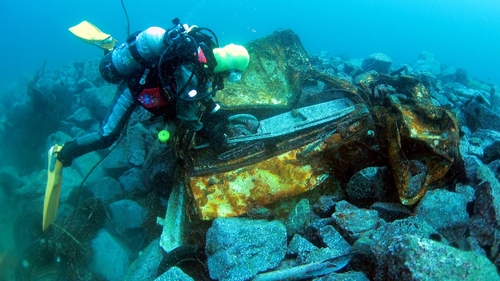March 30, 2013
Volunteer Divers Clean Up Disaster Debris along Sanriku Coast
Keywords: Civil Society / Local Issues Disaster Reconstruction NGO / Citizen

Copyright Sanriku Volunteer Divers
Efforts are being made through diving to restore Sanriku coastal areas that were devastated by the Great East Japan Earthquake. Sanriku Volunteer Divers is a group of divers that was established by Hiroshi Sato, a diving instructor from Iwate Prefecture. Since the earthquake, the group has been diving almost every day to continue restoring the areas.
The group's activities involve cleaning up and investigating the sea and rivers using advanced diving skills . By working with local fishery cooperatives, the diving group is making efforts to clean up large debris, collect fishing gear, conduct investigations before setting up aquaculture farms, conduct ecology investigations and collect harmful substances. The group also investigates rivers and removes debris, as spawning salmon begin traveling upstream.
Furthermore, volunteers from all over Japan are being accepted into and assigned to appropriate projects. Furthermore, the group provides a matching service for local volunteer centers to assign volunteers from all over Japan to appropriate projects. Volunteers wishing to participate in underwater activities require a certain amount of diving experience. However, non-divers can participate in shore-based work, such as assisting in removing debris or cleaning up coastal areas.
In order to increase awareness of the devastations caused by the tsunami that hit the Sanriku coastal area, the Sanriku Volunteer Divers are making preparations to promote programs such as exchanges among fishing villages, fishing experience, charity diving and observing salmon swimming upstream to spawn. Going forward, while continuing to engage in volunteer activities, the group would like to make their volunteer activities more of an ecotourist attraction, depending on the recovery of local areas, and to create opportunities for people to learn about the rich natural environment of Sanriku while observing the recovery progress.
Related
"JFS Newsletter"
- Aiming to Build New Communities in Earthquake-Stricken Areas: Ishinomaki Jichiren's Initiatives
- Investment to Help Disaster-affected Areas -- Initiative of Disaster Area Support Funds Initiative
- Disaster-Affected Ishinomaki -- Present Status (Part 2)
- Disaster-Affected Ishinomaki -- Present Status (Part 1)
- Tohoku and the World: 5 Years Since The Great East Japan Earthquake and Tsunami


